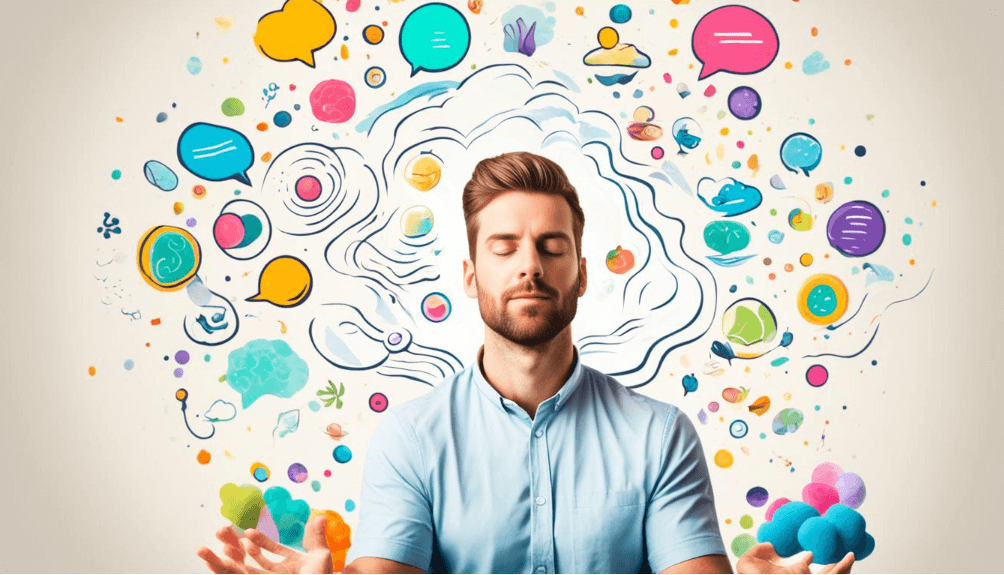Mindfulness for productivity is becoming pretty popular among professionals. It’s supported by successful CEOs and solid data. Techniques like taking five deep breaths when stressed work well. They help keep focus on the task at hand, not on future worries.
Scientific studies now back what ancient wisdom said about mindfulness. Tools like MRI and EEG show its benefits. The paper “The Influence of Mindfulness on Workforce Productivity” talks about it. It says mindfulness can make work environments better. Techniques like conscious breathing and active listening improve productivity and efficiency.
Mindfulness helps with mental health and self-esteem at work. Aetna found mindfulness cuts procrastination by 62 minutes a week. It also increases motivation, creativity, and a positive work culture.
What is Mindfulness?
Mindfulness comes from old traditions but is now shown to help a lot with doing better at work and feeling good. It means paying full attention to what’s happening right now without getting distracted. Rather than not thinking at all, mindfulness means really connecting with what you are experiencing at the moment and not worrying about the past or what’s coming next.
Definition and Concepts
Mindfulness is more than just meditating. It’s about focusing on the present by choice. By practicing regularly, even when doing everyday things, you gain conscious awareness. This type of awareness helps improve attention and thinking skills which are key for getting things done well. Happy workers are up to 20% more productive, a study by the University of Warwick found.
The Importance of Being Present
Focusing on the now is core to mindfulness and boosts how well and happy you feel. Research, including a study in Brain Imaging and Behavior, shows mindfulness cuts down on daydreaming, which improves memory and focus. Another study from John Hopkins University found it can also lessen feelings of anxiety, depression, and stress, making people more satisfied at work.
By making mindfulness a part of daily life and work, regular tasks become more engaging. Just three weeks of mindfulness practice can grow your focus by 14% and greatly reduce how much your mind wanders.
How Mindfulness Affects the Brain

Studies show mindfulness greatly boosts brain health and mental wellness. Experts like Judson Brewer and David Creswell have shed light on this. They focus on Mindfulness-Based Stress Reduction and Mindfulness-Based Cognitive Therapy.
Scientific Research and Studies
Mindfulness changes how we feel and think. Judson Brewer works on using it to help with addiction. David Creswell shows it can improve social ties and help people age better.
It also makes certain brain areas more active. These areas help with thinking and controlling impulses. Lutz, Dunne, and Davidson found it reduces stress by affecting the amygdala.
Changes in Brain Structure
Regular mindfulness leads to noticeable changes in the brain. It can make the brain’s cortex thicker. This is important for focus and sensing the world around us.
It increases gray matter in parts of the brain important for making decisions. Meditation helps keep the prefrontal cortex robust as we age. It also boosts creativity and relaxation, showing how important mindfulness is for our brains.
Benefits of Mindfulness for Productivity
Mindfulness boosts productivity by improving cognitive skills, decision-making, and stress handling. It makes work better when we practice it daily.
Increased Focus and Memory
Meditation helps our brain stay focused and remember things better. Just 10 minutes a day can make us more productive. This cuts down on getting distracted or remembering less important stuff.
The fact is, most employees really focus for less than 3 hours a day. Mindfulness can make a big difference in our work by improving how well we focus and remember tasks.
Improved Decision-Making Abilities
Mindfulness helps our brain make better decisions by reducing wrong biases. Many successful leaders use it to think clearly and judge fairly. After a mindful program at General Mills, 80% of people made better decisions.
Reduced Stress Levels
About 76% of workers feel stressed at their jobs. Mindfulness reduces stress, anxiety, and depression. It makes work feel happier and more relaxed.
Studies say mindfulness prevents getting too stressed, improves sleep, and helps us understand others better. Big companies like Google and Apple use it to keep employees creative and happy. This shows how mindfulness makes our work life better.
Mindfulness Techniques for the Workplace
Mindfulness at work boosts productivity and well-being. It includes easy gratitude acts to structured meditations. All aim at promoting wellness.
Starting with Gratitude
Starting the day with gratitude helps a lot. The University of Wisconsin-Madison found it brings better health and relationships. Reflecting on work positives can make the day better.
Regular Breaks and Time in Nature
Breaks with nature time are key for mental health. Just minutes outside can lower stress and clear the mind. Harvard University found that not doing so harms well-being. Mindful breaks are crucial.
Breathing Exercises and Meditation
Breathing and meditation help focus and control emotions. Deep-breathing brings us to the moment. Google workers say it makes them more productive.
Doing these exercises daily changes the brain in weeks. It fosters a supportive work environment.
Integrating Mindfulness Practices into Your Daily Routine

Starting a daily mindfulness practice takes steady commitment. You can create a stress-lowering routine by adding different activities. These include being thankful, taking nature breaks, and being aware of your senses.
It’s easy to practice gratitude every day. Every morning, think of three things you’re thankful for. This will make your day start off right. Also, taking short breaks to enjoy nature helps lower stress. Just a few minutes outside, paying attention to what you hear and see, makes you feel relaxed. For more on combining mindfulness with work, visit this helpful guide.
Eating mindfully is about noticing how your food tastes and smells. This practice keeps you in the now and connects you with your body’s needs. Adding breathwork and meditation to your day is important too. Breathing deeply, especially in stressful times, calms you down.
Writing in a journal is good for personal growth. It lets you think about your thoughts, feelings, and what’s happening around you. Keeping track of your mindfulness path encourages honesty and self-discipline. For more simple mindfulness tips, check out this blog post from Calm.
Keep up your mindfulness practice by choosing a few techniques that you like. Start with easy steps and celebrate your progress. Mindfulness means living in the moment without judging. It positively affects every part of your life. For more on how mindfulness improves time management and productivity, see this article.
Enhancing Creativity Through Mindfulness

Mindfulness boosts our creative skills in a big way. It helps us think in new and innovative ways by making us more aware. Being mindful means we pay close attention to our thoughts, feelings, our bodies, and what’s around us. This matches well with being creative.
Divergent and Convergent Thinking
Mindfulness makes us better at divergent thinking, which means coming up with many new ideas. This is important for brainstorming new things. On the other hand, convergent thinking gets a boost too. It’s about finding the best answer and sticking with it. Mindfulness helps us focus and avoid getting sidetracked, making it easier to come up with and polish good ideas.
The Creative Process and Mindfulness
Mindfulness helps with every step of creating something new, from the start to the final touch. Research shows it makes us more innovative and better at solving problems. Using mindfulness in schools can make students more creative and happy. By practicing mindfulness, both professionals and students can become more productive and creative.
Building Better Relationships with Mindfulness
Mindfulness improves how we work together. It helps us understand and care for our feelings and thoughts. It makes us better at working with others. We learn to listen and accept people as they are. This helps everyone to share ideas freely.
Being mindful means staying focused in the moment. It means we don’t judge others quickly. We also become open to new viewpoints. This creates a better team spirit.
Collaboration and Teamwork
Mindfulness creates a friendly place at work. Everyone feels important and listened to. This makes the team stronger.
It helps us know our emotions and reactions. We deal with problems better. We work together well. We also see the good in others. This makes us get more work done together.
Communication and Empathy
Talking well is key at work. Mindfulness makes us listen better and understand others’ feelings. This helps everyone feel valued.
Mindful talking means we are honest and open. This builds trust. Strong bonds are formed at work. This makes the workplace better for everyone.
Overcoming Challenges in Mindfulness Practice

Mindfulness in daily life has its hurdles. Understanding and overcoming these can really boost growth and resilience.
Handling Distractions
Distractions can block effective mindfulness. Stress can make us restless or upset, harming mindfulness. Knowing distractions and coming back with kindness is key.
We must stay persistent and focused. Being tired or hungry can also make it harder. Eating well helps us stay on track and resilient.
Reframing Failures
Mindfulness helps us see failures as chances to grow. This thinking builds resilience. Doubting mindfulness can make sticking with it hard.
Yet, regular practices like deep breathing reduce stress. This improves focus and emotional control. Feeling strong emotions or pain can distract us too.
Noticing when we’re upset during practice teaches us a lot. It shows us how to stay mindful under stress. This helps us handle life better and with less stress.
Conclusion
Mindfulness helps us do better at work. It’s not just about less stress. It helps us think better, get along with others, and solve problems in new ways. Now, over half of American companies teach their workers mindfulness. This is a big change that helps people feel better and work better.
Studies show mindfulness really works. For example, doing breath-focused meditation in the morning can make you more focused. This is especially true in stressful jobs, like in IT. Loving-kindness meditation can have different results on how we feel for others, like in call centers. But overall, mindfulness makes us less stressed and better at handling our feelings. This is really helpful for people who work from home.
But, mindfulness takes time and effort to learn. The good news is, it’s worth it. It not only makes us more productive but also helps us get along better at work. It helps us reach our personal and work goals. The Harvard Business Review and other studies confirm this. Mindfulness leads to a team that’s more focused, creative, and strong emotionally.
FAQ
What is mindfulness?
Mindfulness means being fully aware in the present moment. You notice your current experiences. You focus on what you’re doing right now.
How does mindfulness contribute to productivity?
Mindfulness makes you more productive. It helps you focus better and make smarter decisions. It also lowers your stress levels.
What are some mindfulness techniques for the workplace?
To be mindful at work, start with gratitude each morning. Take moments to enjoy nature. And do breathing exercises or meditate.
How does mindfulness affect the brain?
Mindfulness changes the brain in good ways. It boosts relaxation and creativity waves. It also makes areas for thinking denser.
Can mindfulness improve decision-making abilities?
Yes, mindfulness makes the brain’s decision area stronger. It helps you make clear decisions. It helps you avoid decision-making traps too.
What are the benefits of integrating mindfulness into daily routines?
Making mindfulness a daily habit reduces stress. It boosts your brain power and helps you grow as a person. Start with a gratitude journal, meditation, and eating mindfully.
How does mindfulness enhance creativity?
Mindfulness helps you think of many new ideas. It also helps you find the best solution. It supports all steps of creating new things.
Can mindfulness improve workplace relationships?
Absolutely. Mindfulness increases awareness and understanding. This improves how we talk and work together. It makes work places friendlier and more united.
What are common challenges in mindfulness practice?
Staying focused can be hard. Also, accepting when things don’t go as planned is tough. Mindfulness helps us see these moments as chances to grow.
How is mindfulness supported by scientific research?
Science backs up mindfulness. Brain scans show it has real benefits. It helps our brains, thinking, and mental health.

More Posts
10 Must-Learn Time Management Lessons Taught in Atomic Habits
"Atomic Habits" by James Clear grabbed the top spot in 2020. It unpacks key strategies for managing time and forming good habits. Its impact on productivity is profound. Many readers even marked it...
Top 10 Benefits of Smart Planners for Businesses in 2026
 Our lives have become so fast-paced it all seems like a haze. The more work you have, the more difficult it is to manage. Situations are worse for business owners with countless...
Top 5 Best Goal Planner Apps
Are you tired of setting personal goals and struggling to accomplish them? Do you find yourself getting distracted and losing focus on your dreams? Well, fret not because help is at hand! In...
10 Time Management Issues Students Should Avoid During Exams
Final exams are key for doing well in school. They can make up 25% to 30% of your final grade. But many students have trouble managing their time for studying. This can hurt...